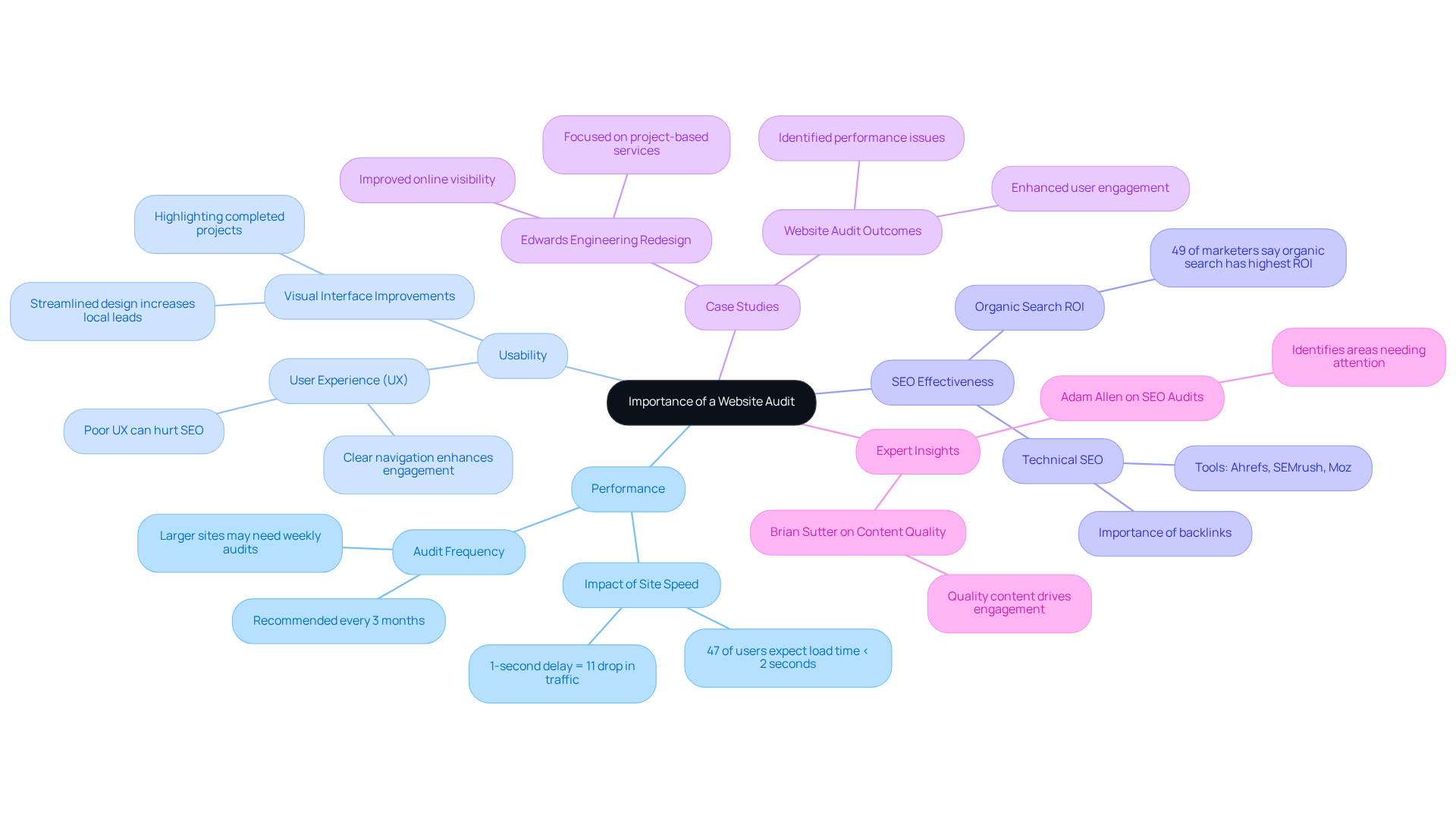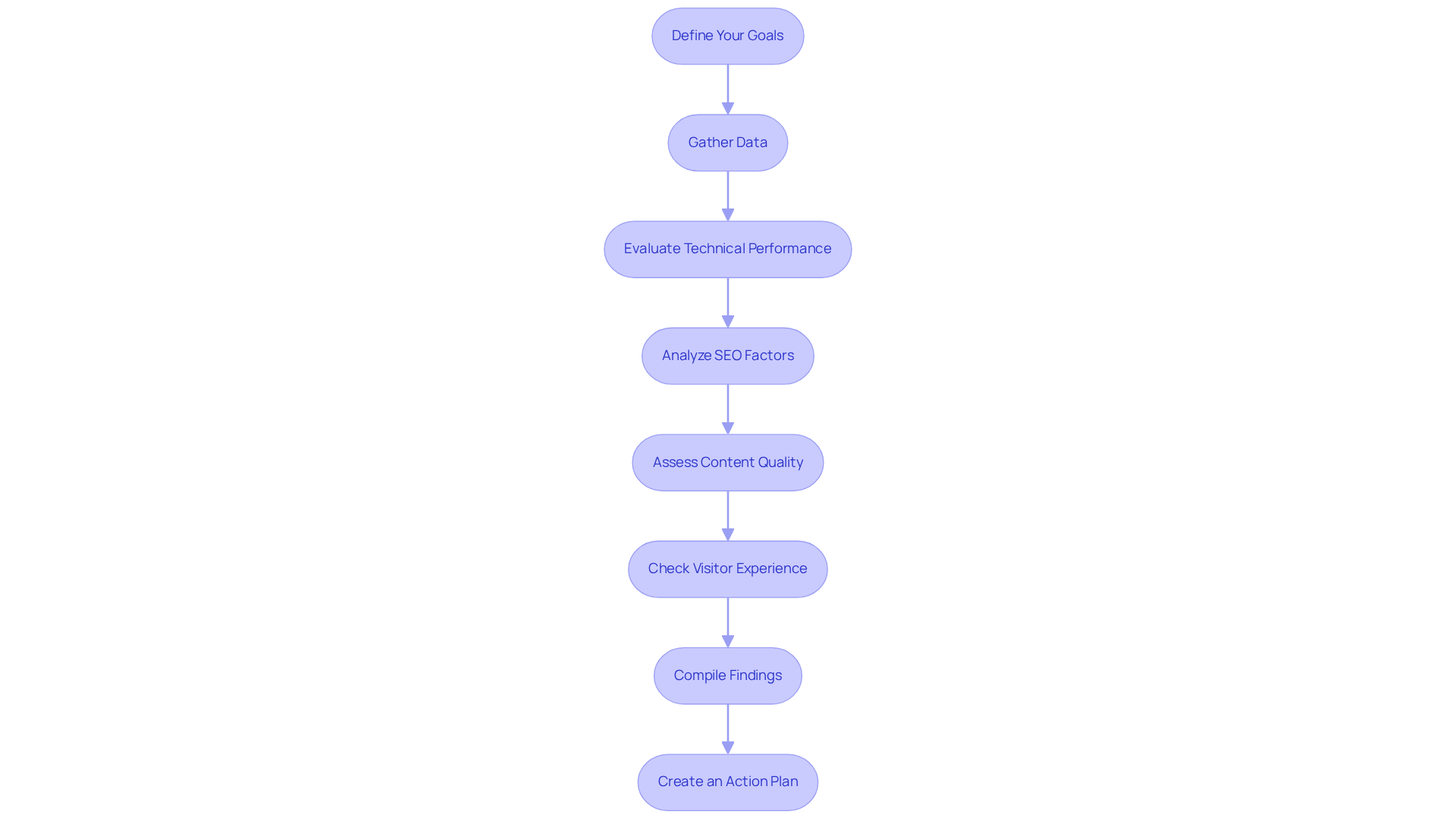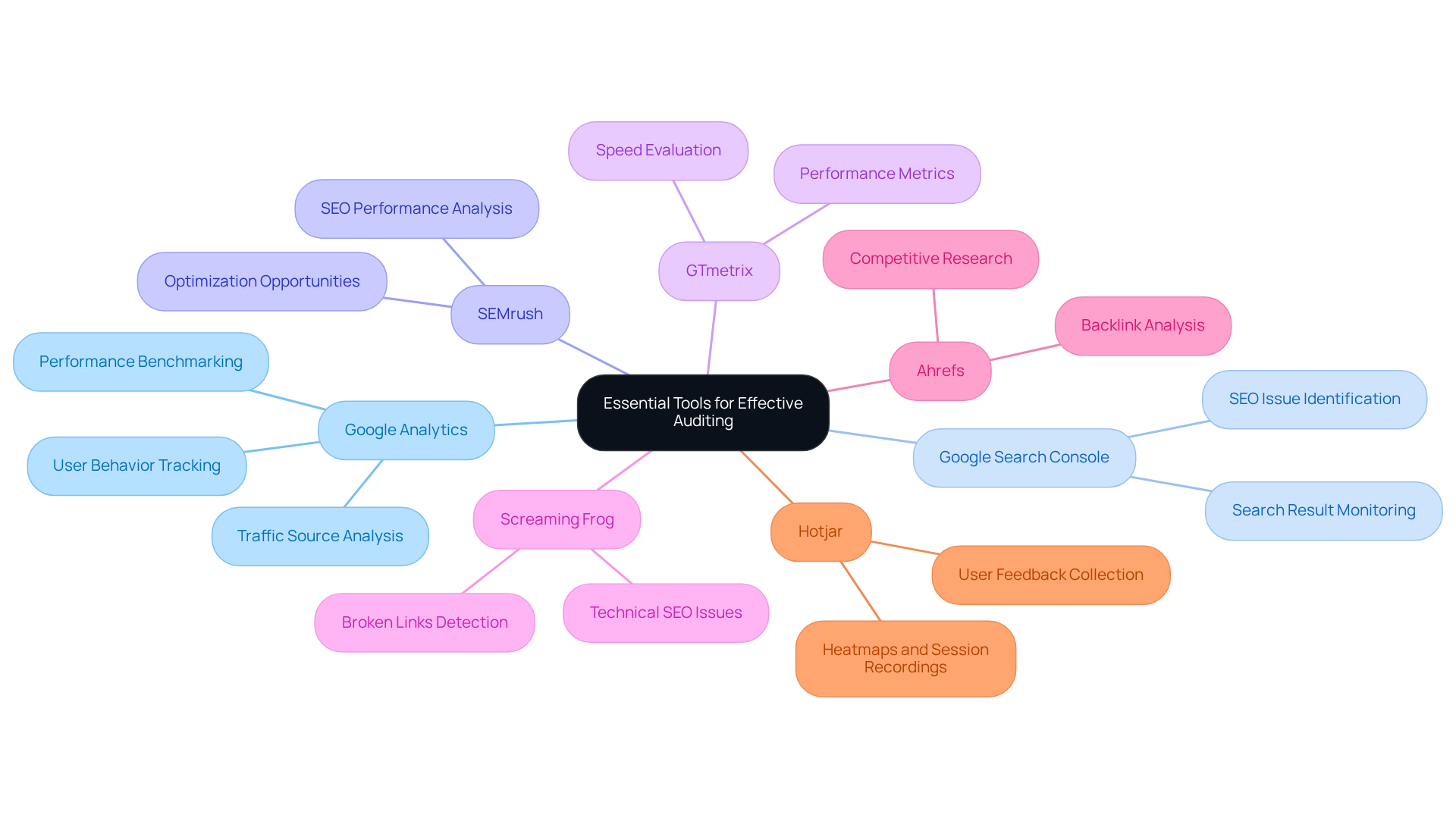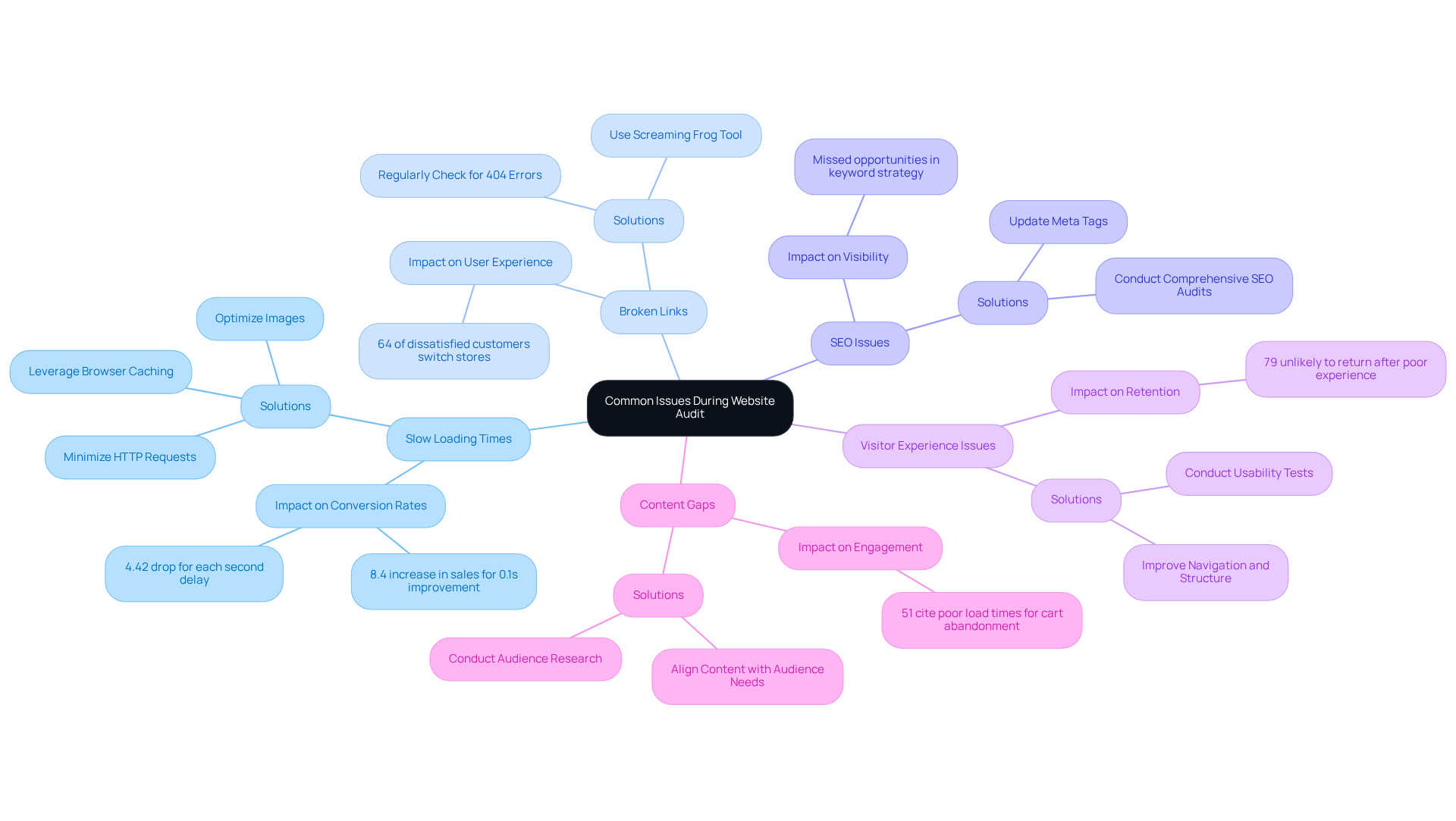Overview
In today’s digital landscape, tech startups often face the daunting challenge of ensuring their websites perform optimally. This can feel overwhelming, especially when the stakes are high—your online presence is crucial for attracting users and driving engagement. A website audit is not just a technical task; it’s a vital step towards enhancing your site’s performance, user experience, and SEO effectiveness. By conducting a thorough audit, you can uncover hidden issues that may be hindering your growth and connection with potential customers.
Imagine pouring your heart and soul into your startup, only to find that technical glitches or poor user experience are driving visitors away. It’s painful to think about the missed opportunities and the frustration that can stem from these challenges. But there is hope. By following a structured approach to your website audit, you can reclaim control and create a more inviting online space for your audience.
Start by defining clear goals for what you want to achieve. Gathering data is the next critical step; it allows you to see the bigger picture of how your site is performing. Evaluating technical performance might seem daunting, but utilizing various analytical tools can simplify this process. These tools are designed to help you identify and rectify issues that could be affecting your online presence.
Remember, you’re not alone in this journey. Many founders have faced similar hurdles and found success by embracing the audit process. By taking these steps, you can foster a website that not only meets the needs of your users but also reflects the passion and dedication you have for your startup. Let’s work together to ensure your online presence shines brightly and effectively engages your audience.
Introduction
Navigating the competitive digital landscape can be daunting for tech startups, and a robust online presence is essential for their success. Yet, many founders find themselves overwhelmed by the complexities of website audits. This crucial process can reveal performance bottlenecks that hinder user experience and diminish search engine visibility.
When these critical areas are overlooked, the implications can be significant, often leading to missed opportunities in a fast-paced market. So, how can these emerging businesses effectively leverage website audits to optimize their platforms and stay ahead of the curve?
By embracing this process, startups can not only enhance their online presence but also foster a deeper connection with their audience, ultimately paving the way for growth and success. At RNO1, we understand these challenges and are here to support you in navigating this journey together.
Understand the Importance of a Website Audit
An auditing website serves as a vital assessment of your site's performance, usability, and SEO effectiveness. For tech startups, these consistent evaluations are crucial for identifying areas for improvement, enhancing client experience, and ensuring adherence to . By recognizing the importance of auditing website performance, startups can proactively tackle issues such as slow loading times, broken links, and outdated content, all of which can detrimentally affect visitor engagement and search engine rankings. Research shows that just a 1-second delay in page load time can lead to an 11% drop in traffic, with 47% of users expecting a site to load in under 2 seconds. This underscores the importance of maintaining optimal site speed.
Frequent evaluations of the auditing website not only foster a strong online presence but also align it with broader business objectives and audience needs. Take, for example, the redesign of Edwards Engineering's website, which aimed to enhance user engagement and by effectively showcasing completed projects. This case highlights how targeted evaluations can lead to meaningful improvements in online visibility.
Moreover, data reveals that 49% of marketers believe organic search delivers the highest ROI among marketing channels, emphasizing the need for startups to prioritize SEO through regular auditing website practices. Expert insights further reinforce this notion; Adam Allen, CEO of LeaseMyMarketing, notes that an auditing website featuring a comprehensive SEO evaluation document clearly identifies areas needing attention, enabling startups to implement corrective actions effectively. Similarly, Brian Sutter, Director of Marketing at Wasp Technologies, stresses the significance of quality content in driving engagement and enhancing SEO performance.
In conclusion, the impact of online assessments on user engagement and SEO performance in the context of auditing website practices cannot be overstated. By committing to regular evaluations—ideally every three months—tech startups can ensure their online platforms remain competitive, user-friendly, and aligned with their strategic goals. Various forms of assessments, including technical, SEO, and UX evaluations, provide unique insights that help improve a website's performance.

Follow a Step-by-Step Process for Conducting Your Audit
- Define Your Goals: Begin by reflecting on what you truly wish to achieve with your assessment. Are you aiming to enhance your SEO, improve user experience, or boost conversion rates? As Daria Gonzalez insightfully points out, "A competitive website evaluation examines a company's site and several rivals to determine what others in the same industry are excelling at and what opportunities in the market remain for your company's site to address." This understanding will serve as a guiding light throughout your evaluation journey.
- Gather Data: Harness the power of analytics tools like Google Analytics to gather insights on user behavior, traffic sources, and conversion rates. This valuable data will inform your audit and help you pinpoint areas ripe for improvement.
- Evaluate Technical Performance: Take a moment to check your website's loading speed, mobile responsiveness, and overall technical health using tools like Google PageSpeed Insights or GTmetrix. Research reveals that up to 53% of visitors abandon pages that take longer than three seconds to load, underscoring the crucial role of site speed in both visitor satisfaction and SEO success.
- Analyze SEO Factors: Dive into the on-page SEO elements, such as title tags, meta descriptions, and keyword usage. Tools like SEMrush can illuminate areas for enhancement, ensuring your site adheres to best practices for search engine optimization.
- Assess Content Quality: Reflect on the relevance and quality of your content. Ensure it resonates with your audience's intent and is optimized for search engines. High-quality content is essential, as it not only engages visitors but also significantly influences SEO rankings.
- Check Visitor Experience: Examine the site's navigation, layout, and overall visitor experience. Conduct usability tests with real participants to gather feedback, which can reveal invaluable insights into how visitors interact with your site.
- Compile Findings: Document all your findings in a comprehensive report, highlighting critical issues and areas for improvement. This report will lay the groundwork for your action plan.
- Create : Craft a prioritized action plan based on your findings to systematically tackle the identified issues. By prioritizing actions according to their severity and impact, you can ensure that your platform evolves in alignment with customer needs and industry standards.

Utilize Essential Tools and Resources for Effective Auditing
Conducting an effective auditing website can often feel overwhelming, especially for tech startup founders striving to establish a strong online presence. The challenge lies in understanding user behavior and optimizing performance amidst a sea of tools and metrics. This can lead to feelings of uncertainty and frustration, as the digital landscape continues to evolve rapidly.
However, there are solutions available that can ease this burden and provide clarity. By utilizing tools such as Google Analytics, you can track user behavior and traffic sources. Did you know that as of 2025, more than 55.49% of online platforms worldwide rely on Google Analytics? This tool has become a . Maryam Oseni aptly states, "Google Analytics remains a dominant force in online analytics, providing businesses with valuable insights into user behavior and performance."
In addition to Google Analytics, Google Search Console allows you to monitor your site's presence in search results and identify SEO issues that may be hindering your visibility. SEMrush serves as a comprehensive tool for analyzing SEO performance and uncovering optimization opportunities that can propel your startup forward.
To ensure that your website performs at its best, GTmetrix evaluates online speed and performance metrics, while Screaming Frog helps identify technical SEO issues, such as broken links and duplicate content. Ahrefs is invaluable for backlink analysis and competitive research, giving you insights into how you stack up against others in your field. Lastly, Hotjar gathers user feedback through heatmaps and session recordings, deepening your understanding of user experience and guiding your improvements.
By leveraging these tools, tech startups can gain valuable insights into their online presence's performance through an auditing website and make informed decisions for enhancement. The growing adoption of Google Analytics 4 (GA4) further emphasizes the importance of these tools in the current digital landscape. Remember, you are not alone in this journey; these resources are here to support you as you navigate the complexities of your online strategy.

Troubleshoot Common Issues During Your Website Audit
During your online evaluation, you may encounter several common challenges that can be quite frustrating. Let’s explore these issues together and find ways to overcome them:
- Slow Loading Times: If you notice your site is sluggish, it’s important to take action. Optimizing images, leveraging browser caching, and minimizing HTTP requests are essential steps to consider. Research shows that even a 0.1-second improvement in load time can boost e-commerce sales by 8.4%. It’s disheartening to think that for every second of delay in website loading, conversion rates drop by 4.42%. Tools like GTmetrix can be invaluable in identifying specific bottlenecks that might be affecting your site’s speed.
- Broken Links: Discovering broken links can be discouraging. Utilizing tools like Screaming Frog can help you identify and fix these issues. Regularly checking for 404 errors and redirecting them to relevant pages is crucial. Remember, 64% of dissatisfied customers will switch to a different online store for the same product, and we want to keep your customers happy.
- SEO Issues: If your SEO performance isn’t where you’d like it to be, don’t worry—you’re not alone. Take a moment to review your keyword strategy, update meta tags, and ensure your content is optimized for search engines. An auditing website can provide a comprehensive SEO audit that reveals missed opportunities and helps rectify poorly executed practices, ultimately enhancing your visibility.
- Visitor Experience Issues: If you’re noticing individuals leaving your site, it’s time to take a closer look at your navigation and structure. Conducting usability tests can provide valuable feedback and guide necessary adjustments. Statistics indicate that 79% of individuals who face poor website performance are unlikely to return, and 64% of online shoppers will switch to a different store after a negative experience. This highlights the importance of creating a seamless experience for your visitors.
- Content Gaps: If your content isn’t resonating, it may be time to revisit your audience research. Ensure your content aligns with their needs and addresses their pain points. Captivating content that fulfills audience expectations can significantly enhance . Notably, 51% of American internet shoppers cite poor load times as the main reason for cart abandonment.
By proactively troubleshooting these issues, tech startups can enhance their user experience through an auditing website that improves performance. Together, we can drive better engagement and sales, ensuring your efforts lead to success.

Conclusion
Regular website audits present a significant challenge for many tech startups striving to enhance their online presence and optimize performance. Without a structured auditing process, startups may struggle to identify and address critical issues that can hinder user experience and SEO effectiveness. This can lead to frustration and missed opportunities in a competitive digital landscape. However, by adopting a proactive approach to website audits, startups can not only improve site performance but also align with broader business objectives, ensuring they remain competitive in an ever-evolving environment.
The key insights from this article underscore the importance of:
- Defining clear goals
- Utilizing essential tools
- Troubleshooting common issues during the auditing process
From assessing technical performance to analyzing SEO factors and content quality, each step in the audit contributes to a deeper understanding of how to engage users effectively. Moreover, by leveraging tools like Google Analytics and SEMrush, startups can empower themselves to make informed decisions that enhance their online visibility and foster meaningful user engagement.
Ultimately, the significance of conducting regular website audits cannot be overstated. By committing to this practice, tech startups can not only improve their site's performance but also nurture a stronger connection with their audience. Embracing the insights and strategies outlined in this guide will pave the way for sustained growth and success in the competitive online marketplace. Start your journey of optimizing your website today; together, we can reap the long-term benefits of a well-audited online presence.
Frequently Asked Questions
What is the purpose of a website audit?
A website audit serves as a vital assessment of a site's performance, usability, and SEO effectiveness, helping to identify areas for improvement and enhance client experience.
Why are website audits important for tech startups?
Website audits are crucial for tech startups to proactively address issues like slow loading times, broken links, and outdated content, which can negatively impact visitor engagement and search engine rankings.
How does page load time affect website traffic?
Research indicates that a 1-second delay in page load time can result in an 11% drop in traffic, with 47% of users expecting a site to load in under 2 seconds.
How often should tech startups conduct website audits?
It is recommended that tech startups conduct website audits every three months to maintain competitiveness and user-friendliness.
What are the benefits of frequent website evaluations?
Frequent evaluations foster a strong online presence, align the website with broader business objectives, and address audience needs, ultimately leading to meaningful improvements in online visibility.
What does the case of Edwards Engineering illustrate about website audits?
The redesign of Edwards Engineering's website aimed to enhance user engagement and local lead generation, demonstrating how targeted evaluations can improve a website's effectiveness.
What is the ROI of organic search according to marketers?
Data shows that 49% of marketers believe organic search delivers the highest ROI among marketing channels, highlighting the importance of SEO in website audits.
How can startups effectively implement corrective actions from audits?
An auditing website featuring a comprehensive SEO evaluation document can clearly identify areas needing attention, allowing startups to implement corrective actions effectively.
What types of assessments are beneficial during a website audit?
Various forms of assessments, including technical, SEO, and UX evaluations, provide unique insights that help improve a website's performance.




